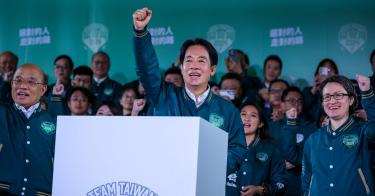On January 13, Taiwan’s voters chose a new president and legislators. China pulled out all the stops to try to intimidate and entice voters into selecting its preferred candidates. This campaign included violating Taiwanese airspace, financing pro-Beijing social media, promoting misinformation and conspiracy theories, paying for lavish trips for Taiwanese officials to China, and applying economic pressure.
It didn’t work. Lai Ching-te of the Democratic Progressive Party (DPP) was elected the island’s next president and will be inaugurated in May. Lai was Beijing’s least-favorite candidate, due to his history of advocating for Taiwan independence and the DPP’s refusal to accept China’s preconditions for dialogue. However, Lai won with a plurality of just 40.1% of the vote and only succeeded because the opposition vote was split between two challengers.
It is hard to know to what extent China’s efforts influenced voter decisions. Each of the three parties that fielded presidential candidates has a strong support base independent of Beijing’s actions. Nor does Beijing’s preference for a given candidate necessarily make that candidate illegitimate. Each of Taiwan’s mainstream political parties seeks to preserve the status-quo, and none of them support unification with China.
Yet, Beijing’s efforts to influence Taiwan’s elections and other political processes are real, and they aren’t going to abate anytime soon. They are part of a decades-long campaign to delegitimize and isolate Taiwan and make Beijing’s one-China principle a reality: “There is but one China in the world, Taiwan is an inalienable part of China’s territory, and the Government of the People’s Republic of China is the sole legal government representing the whole of China.”
>>> The U.S. Is Right to Support Taiwan’s Participation in International Organizations
Beijing has vowed to impose unification by force if necessary. But it prefers to play the long game.
For instance, dating back decades, Beijing has conducted an increasingly aggressive campaign to isolate Taiwan and impede its participation in international organizations.
China was one of the original 51 member states of the United Nations. Due to its participation in the alliance of victors of World War II, China was awarded a permanent seat on the U.N. Security Council when the organization was founded in 1945. In the first few decades of the U.N., China was represented by the Republic of China. Shortly after the U.N. was founded, the Chinese Communist Party gained momentum in the civil war and controlled the entire Chinese mainland, with ROC forces retreating to Taiwan.
In the early 1950s, the CCP-controlled PRC initiated a prolonged diplomatic campaign to take over the representation of China in the U.N. and other international organizations. This effort culminated with the adoption of U.N. General Assembly Resolution 2758, which recognized the PRC as “the only legitimate representatives of China to the United Nations.”
Since then, with rare exceptions, Beijing has opposed Taiwan’s participation in international organizations and has applied diplomatic and economic pressure to convince other governments to sever diplomatic ties with Taiwan and oppose its participation in international organizations. In 2023, Honduras became the latest government to sever ties with Taiwan, leaving only 13 governments that recognize Taiwan.
Across the U.N. system, China has now succeeded in ostracizing Taiwan. For instance, Taiwan is not able to participate as an observer in any meetings of the U.N. or its specialized agencies despite the many equities that Taiwan has in matters considered by those organizations.
This effort has gone to ridiculous and petty lengths. For instance, Beijing has strong-armed the U.N. to deny private citizens access to U.N. headquarters or register for U.N. conferences if they have Taiwanese passports. Additionally, it has blocked applications from non-governmental organizations (NGOs) seeking consultative status with the U.N. unless they “explicitly recognize Tibet and Taiwan as integral parts of Chinese territory.”
Beijing’s efforts are a direct assault on the rights of the Taiwanese people who overwhelmingly wish to preserve the status quo of de-facto sovereignty under a democratic system that is fully separate from Beijing.
>>> Managing Trade-offs Between Military Aid for Taiwan and Ukraine
The U.S. understands and rejects this illegitimate campaign. When the U.S. recognized Beijing in 1979, it also announced that it opposes any unilateral change to Taiwan’s status and would support Taiwan’s ability to defend itself from forced unification with China. This position has enjoyed broad bipartisan support since the passage of the TRA and U.S. policy was articulated under the Reagan Administration in its Six Assurances to Taiwan.
In the past few years, Congress has passed legislation clarifying that U.S. policy is to advocate for Taiwan’s participation in international organizations and instructing the administration to implement a strategy to counter efforts by Beijing to undermine support for Taiwan internationally, including its participation in international organizations.
This policy is based on U.S. interests, as Taiwan is generally supportive of American policy in these organizations. But more fundamentally, it is based on the belief that 23 million people deserve a voice in the international system—a voice that is currently silenced at the behest of Beijing.
Taiwanese democracy is vital and worth defending—and demonstrates that the Chinese people are perfectly capable of having a free system of government when given the opportunity. This was not only the case in the election that took place Saturday. It will continue to be true in the years ahead.
This piece originally appeared in Fox News



